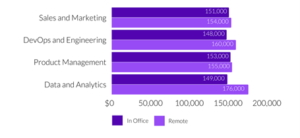Subsequent to the success of the huge work-from-home or anywhere-remotely trend, location-based salaries and compensation are being questioned and re-evaluated.
Lockdowns across the US meant many employees began working remotely and far from the tech-hubs their companies call home. Research has even revealed that 43% of employees now expect organizations to offer remote work after the pandemic ends. But since lockdowns have lifted, there has been no mass return to the office. Instead, remote work is taking precedent.
Not only this, but it seems that compensation and salary levels are no longer tied to the pay ranges of high-cost areas, with many remote workers now being paid the same – if not more – to work for a tech-hub based HealthTech from anywhere in the US.
The Current Market
Across the major US Tech hubs, the current average salary for a remote HealthTech role is $158,000. This is 5% higher than the current average for in-office roles. Three of the country’s ‘superstar’ Tech cities: San Francisco, New York, and Boston, are all paying higher for remote roles than in-office, with Boston offering 3% higher salaries, New York 11%, and San Francisco offering a staggering 21% higher for remote salaries than in-office.
Not only this, remote HealthTech roles are currently paying higher salaries across all major Tech functions in HealthTech in the US:

And the trend of higher pay for remote work isn’t exclusive to the technology industry. Analysis by PayScale shows that across all sectors, remote workers earn 8.3% more than non-remote workers doing the same role, with the same experience. Overall, PayScale also found that employees that’re fully remote earn greater compensation than employees who don’t work remotely at all.
Some argue remote workers should be paid a salary based on the affordability of where they live. Senior HR professional, Laura Handrick, explains how traditionally, total compensation has been based on pay rates that are market driven and adjusted geographically. She comments,
“A CFO in New York is paid more on average than one in Kansas City, just as an IT professional working at a Fortune 100 is likely paid more than working for a startup.”
Though it is early, the move to remote work is changing long-held perceptions that where people live should determine what they make. So, what does this mean for the US HealthTechs that’re looking to attract and retain the top HealthTech talent?
Demand For Top Talent Gives Skilled Workers The Leverage
The nationwide lockdowns in 2020 subsequent to Covid-19 meant that many employees began working remotely and far from the Tech-hubs their companies are based in. There is no doubt that the pandemic spurred this seismic shift to remote work; but now that lockdowns are lifting, HealthTechs are continuing to support the move of employees relocating and many have opted to not adjust their salaries or compensation down.
When remote workers are no longer the outliers, talent will not be concentrated in major Tech cities, but dispersed. The prospect of applying for a role anywhere in the US is a career game-changer for many. Previously, someone who’s stuck in a region which doesn’t offer competitive roles would have to settle for what’s available. Not only this, cities like San Francisco, New York and Boston are expensive, with life in San Francisco Bay being roughly 32% more expensive than the average US city. New vistas are opening up for HealthTech workers, who can now live in cheaper locations and afford a greater lifestyle through HealthTechs recruiting away from major Tech hubs, whilst still offering top of the market salaries.
And it’s important that these HealthTechs continue to value their remote workers as highly as in-office workers. Adam Jackson, CEO of talent network Braintrust, says:
“Companies looking to cut pay for employees who change geographic locations when their job can be done just as well remotely as in-person (an important criteria) are essentially telling those employees they were overpaid before Covid and this is a ‘fair market adjustment’ of their pay.”
Supporting and understanding the various sacrifices that all employees make is the only fair way to proceed in this climate. It is also the most effective way. Numerous studies have found that remote workers, when properly supported and catered for, are just as efficient – if not more – than in-office workers, and are more capable of doing the same quality and quantity of work. Not only this, job seeking behavior is 55% more prominent amongst workers who cannot work remotely. Ultimately, if you want to attract and, more specifically, retain the top talent in the HealthTech space, offering the opportunity for remote work and valuing your remote workers by not lowering salary levels is key.

The Market For Talent Is More Competitive Than Ever Before
This new remote-work trend is revolutionary for many HealthTech workers. But for employers, the competition for this skilled talent is higher than ever before. Before the shift to remote work, employers were concerned about other companies in their immediate vicinity hiring for the same roles. Now, they’ll have to compete with the mass volume of market hub HealthTechs hiring all over the US at the same – if not higher – rates. And the competition isn’t simply between Tech hubs and more remote HealthTechs: key HealthTech hubs are also in major competition with one another. For example, in San Francisco, the current average remote HealthTech salary is 13% higher than the average in-office salary in New York.
Even for mature HealthTechs, 2020 launched CIOs, hiring managers, company leaders and recruiters into a crisis for Tech talent. This spike in demand for skilled HealthTech workers has spilled over from 2020 into 2021, and it’s set to continue into 2022; and it has given talent the leverage to look and push for higher salaries. To compete in this market, HealthTechs across the US – whether based in key Tech hubs or neighboring towns – need to take a look inwards and consider if their salaries and compensation are aggressive enough to attract the top talent in this climate.
If you’d like advice on HealthTech salaries and compensation, get in touch with our expert consultants! Alternatively, if you’re looking to make your next strategic hire, our consultants can also assist you with your hiring needs. Their vast networks of specialist HealthTech talent have experience in remote, in-office, and hybrid roles. Find out more about the functions we work in here.







